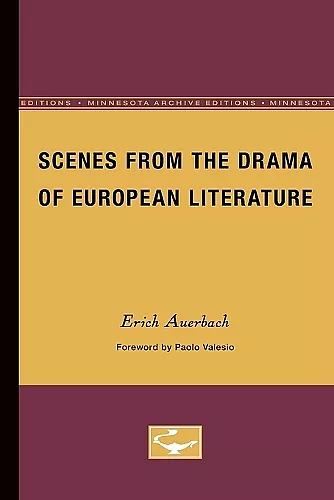Scenes from the Drama of European Literature
Format:Paperback
Publisher:University of Minnesota Press
Published:28th Jun '84
Currently unavailable, our supplier has not provided us a restock date

Scenes from the Drama of European Literature was first published in 1984. Minnesota Archive Editions uses digital technology to make long-unavailable books once again accessible, and are published unaltered from the original University of Minnesota Press editions.
In his foreword to this reprint of Erich Auerbach's major essays, Paolo Valesio pays tribute to the author with an old saying that he feels is still the best metaphor for the genesis of a literary critic: the critic is born of the marriage of Mercury and Philology. The German-born Auerbach was a scholar who specialized in Romance philology, a tradition rooted in German historicism—the conviction that works of art must be judged as products of variable places and times, not from the eye of eternity, nor by a single unchanging aesthetic standard. The mercurial element in Auerbach's work is significant, for in a life of motion—of exile from Hitler's Germany—he came to believe that literary history was evolutionary, ever-changing—a view reflected in the title of his book, which suggests life and literature are historical drama.
Auerbach is best known for his magisterial study Mimesis: The Representation of Reality in Western Literature, written during the war, in Istanbul, when he was far from his own culture and from the books that he normally relied on. In 1957, just before his death, he arranged for the publication in English of his six most important essays, in a volume called Scenes from the Drama of European Literature.As in Mimesis,Auerbach's fresh insights bring to the disparate subjects of the essays a coherence that reflects the unity of Western, humanistic tradition, even while they hint at the deepening pessimism of his later years.
In the first essay, "Figura," Auerbach develops his concept of the figural interpretation of reality; applied here to Dante's Divine Comedy,it also served as groundwork for his treatment of realism in Mimesis. A second essay on Dante's examines the poet's depiction of St. Francis of Assisi. The next three essays deal with the paradoxical nature of Pascal's political thought; the merging of la cour and la ville—the king's entourage and the bourgeoisie—chiefly in relation to the seventeenth-century French theater; and Vico's formulation concepts by the German Romantics. In the final essay Auerbach confers upon Baudelaire's Fleurs du Mal the designation "aesthetic...
ISBN: 9780816612437
Dimensions: 229mm x 152mm x 18mm
Weight: unknown
280 pages